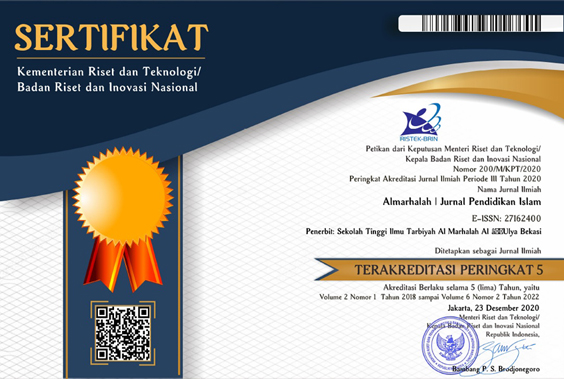DETERMINANT FACTORS IN ISLAMIC EDUCATION: A PHILOSOPHICAL PERSPECTIVE
DOI:
https://doi.org/10.38153/almarhalah.v9i1.152Keywords:
Islamic Education, Philosophy of Education, Determinant FactorsAbstract
Islamic education is a crucial component of the education system, aiming to shape Muslim individuals who are both morally upright and knowledgeable. From a philosophical perspective, several factors influence the implementation of Islamic education and provide a strong philosophical foundation for its development. This study aims to identify the determinant factors of Islamic education within the framework of philosophy. This study is a library research, focusing on studies that discuss the determinant factors of Islamic education from a philosophical standpoint. The data for this study were obtained from research conducted and published in reference books as well as national and international journals.
The findings indicate that the determining factors in Islamic education include educators, learners, educational objectives, educational tools, and the environment. This research provides a comprehensive understanding of the factors that influence Islamic education within the context of philosophy, as well as their relevance in shaping the character and personality of Muslims. The philosophical implications of these factors can assist educators, educational institutions, and policymakers in applying a holistic approach to designing an education system that not only focuses on academic aspects but also encompasses spiritual, moral, and social dimensions, in line with the vision of holistic Islamic education.
References
Akmir Sukirman, & Hidayah, M. (2024). Alat-Alat Pendidikan. Jurnal Intelek Dan Cendikiawan Nusantara, 14, 5145–5151.
Al-Attas, S. M. N. (1979). Aims and Objectives of Islamic Education. King Abdul Aziz University.
Al-Ghazali. (1995). Ringkasan Ihya Ulumuddin (P. Amani, Ed.).
dan Kebudayaan RI, K. P. (2003). Undang-Undang Republik Indonesia tentang Sistem Pendidikan Nasional (UU Sisdiknas Nomor 20 Tahun 2003).
Daryanto, H. M. (2005). Administrasi Pendidikan. Rineka Cipta.
Estari, A. W. (2020). Pentingnya memahami karakteristik peserta didik dalam proses pembelajaran. Social, Humanities, and Educational Studies (SHEs): Conference Series, 1439–1444.
Hashim, R. (2005). Educational Dualism in Malaysia: Implications for Theory and Practice. The Other Press.
Kasiono Rama, B., & Rasyid, M. R. (2023). Nuansa Pendidikan Islam Dalam Undang-Undang RI No. 20 Tahun 2003 Tentang Sisdiknas: Peran Dan Tujuan Pendidikan Nasional. PIJAR: Jurnal Pendidikan Dan Pengajaran, 1(1), 91–101. https://doi.org/10.58540/pijar.v1i1.133
Lefrancois, G. R. (1999). Psychology for Teaching. Wadsworth Publishing.
Marjuni, A. (2019). Peran Guru dalam Perspektif Kepemimpinan Pendidikan. Jurnal Inspiratif Pendidikan, 8(1), 10–18.
Miles, M. B., Huberman, A. M., & Saldana, J. (2014). Qualitative Data Analysis: A Methods Sourcebook. Sage Publications.
Moleong, L. J. (2011). Metodologi Penelitian Kualitatif. PT Remaja Rosdakarya.
Nabil, N. (2020). Dinamika Guru Dalam Menghadapi Media Pembelajaran Teknologi Informasi Dan Komunikasi. Almarhalah: Jurnal Pendidikan Islam, 4(1), 51–62.
Nasir M., M. A., & Mahmud, M. N. (2024). Faktor-Faktor Determinan Pendidikan Islam Dalam Kajian Filsafat. Edu Sociata: Jurnal Pendidikan Sosiologi, 7(1), 451–463.
Ramayulis. (2009). Filsafat Pendidikan Islam. Kalam Mulia.
RI, K. A. (2022). Qur’an dan Terjemah. https://quran.kemenag.go.id/
RI, P. P. (2003). Undang-Undang Nomor 20 Tahun 2003 Tentang Sistem Pendidikan Nasional. https://peraturan.bpk.go.id/Details/43920/Uu-No-20-Tahun-2003
Sada, H. J. (2015). Pendidik Dalam Perspektif Al-Qur’an. Al-Tadzkiyyah: Jurnal Pendidikan Islam, 6(1), 93–105.
Sardiman, A. M. (2019). Interaksi dan Motivasi Belajar Mengajar. Raja Grafindo Persada.
Sari P., S. S., & Sinaga, O. (2023). Ing Ngarsa Sung Tulada, Ing Madya Mangun Karsa, Tut Wuri Handayani: Nilai Kepemimpinan Etnik Jawa Dan Relevansinya Dengan Trend Perkembangan Masa Depan Organisasi Pendidikan. Jurnal Genta Mulia, 14(2).
UNESCO. (2016). Education for Sustainable Development Goals: Learning Objectives.
Uno, H. B. (2023). Teori Motivasi dan Pengukurannya: Analisis di Bidang Pendidikan. Bumi Aksara.
Downloads
Published
Issue
Section
License
Copyright (c) 2024 Sri Mulyani, Andi Marjuni, Andi Achruh

This work is licensed under a Creative Commons Attribution-NonCommercial-ShareAlike 4.0 International License.









